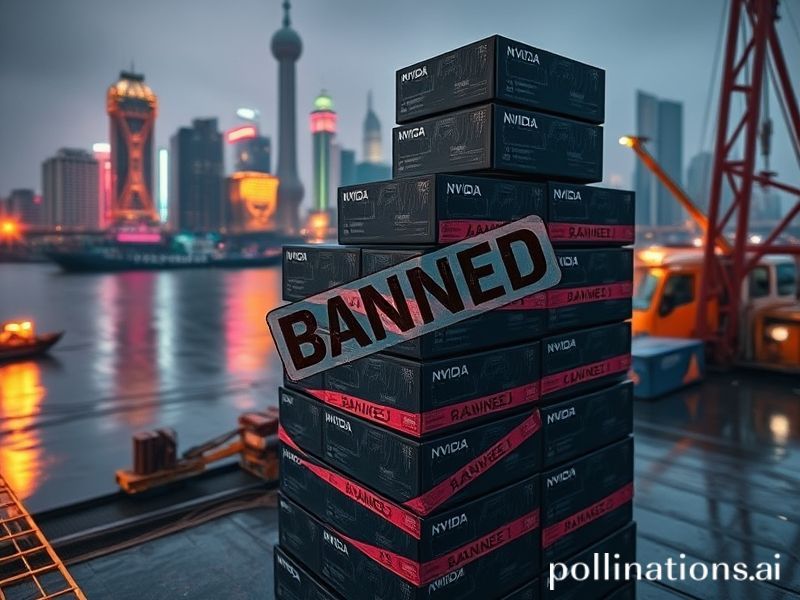China Bans Nvidia Chips: How a Silicon Embargo Became the World’s Priciest Temper Tantrum
China Puts Jensen Huang on the Naughty List
Beijing’s latest export-control tantrum bans the sale of Nvidia’s top-shelf A100 and H100 chips to the Middle Kingdom, a move that lands somewhere between a geopolitical slap-fight and a very expensive game of keep-away. In the grand tradition of great-power pettiness, officials waited until Nvidia had shipped roughly $5 billion worth of silicon to Chinese data centers before announcing the retroactive embargo—proving once again that timing, like irony, is best served cold.
Global Context, or How We Learned to Stop Worrying and Love the Chip War
Washington kicked off this particular sandbox squabble last October with sweeping restrictions on advanced semiconductor gear. Beijing’s retort, unveiled last week, bars “high-performance integrated circuits”—the kind that power large-language-model training, facial-recognition panopticons, and whatever TikTok uses to keep teenagers scrolling until their retinas detach. The tit-for-tat leaves the rest of the planet in the familiar posture of spectators at a divorce hearing: awkwardly pretending not to notice the couple hurling wedding china at each other while quietly calculating the resale value of the shards.
Implications—Because Someone Has to Pretend This Isn’t Just Cosmic Farce
For Nvidia, the ban slices off roughly 20 percent of quarterly revenue, a hole big enough to make even Jensen Huang’s leather jacket look threadbare. Wall Street reacted with the composure of a toddler denied candy, sending the stock down eight percent before bargain-hunters swooped in, apparently reassured that gamers still exist somewhere beyond the metaverse. Meanwhile, China’s AI unicorns—once fat on American GPUs—must now retrain their models on whatever home-grown silicon the Ministry of Propaganda can cobble together. Think of it as switching from a Ferrari to a lawnmower mid-race: technically forward motion, but mostly just noise and smoke.
Europe, ever the conscientious objector, finds itself in the ludicrous position of thanking both superpowers for the distraction. Brussels has been trying to build its own semiconductor supply chain since roughly the Bronze Age; now, with Washington and Beijing busy weaponizing wafers, EU bureaucrats can finally push through subsidies without anyone noticing. Expect fresh slogans about “technological sovereignty” and “digital resilience,” dutifully translated into 24 languages and promptly ignored by voters who just want cheaper smartphones.
Across the Pacific, South Korea and Taiwan—the geopolitical equivalent of Switzerland with fabs—are quietly printing money. Samsung and TSMC will happily vacuum up any orders Nvidia can no longer fulfill in China, proving once again that the best way to profit from a bar fight is to sell bandages. Japan, nostalgic for the 1980s, is dusting off its own chip ambitions. Rumor has it the government is considering subsidies so generous they’ll make Tokyo real estate look affordable.
Broader Significance, or Why the Universe Is Laughing at Us
Strip away the acronyms and the ban is really about one question: who gets to program the next century’s reality. AI trained on oceans of data can sway elections, design drugs, or generate infinite cat memes—sometimes all three before lunch. By choking off the hardware that makes such sorcery possible, Beijing is essentially declaring that it would rather live in a slower, dumber future than one shaped by Californian engineers who still think “don’t be evil” is a viable corporate mission statement.
The tragic punch line, of course, is that nobody wins. China will spend billions reinventing wheels already perfected in Silicon Valley; the U.S. will hemorrhage market share to opportunistic middlemen; and the rest of us will keep doom-scrolling on devices assembled in factories that resemble dystopian novels with better overtime pay. In the end, the chips fall where they may—usually into the pockets of whichever customs official remembered to declare them.
Conclusion
So here we are, citizens of a fractured planet, watching superpowers turn microchips into macro grievances. The ban on Nvidia hardware may look like a tactical maneuver in the new Cold War, but peel back the layers and it’s really just humanity’s oldest hobby: hoarding shiny objects while pretending the other kids can’t have any. In that spirit, raise a glass—preferably one made in a neutral country—to the enduring truth that nothing unites us quite like the urge to divide each other. And remember: somewhere in a windowless server farm, an AI is learning to write this exact sentence, only funnier.







